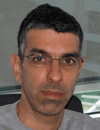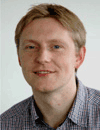Reuven Agami
Head of Division / Group Leader, The Netherlands Cancer InstituteReuven Agami performed his PhD research (Thesis: Cell cycle and apoptosis control induced by the tyrosine kinase c-Abl) within the department of molecular genetics at the Weizmann Institute of Science, Israel. During his research he identified a novel DNA-damage-induced apoptosis pathway that requires the activation of c-Abl kinase and tyrosine phosphorylation of the p53 homologue- p73a. As a post-doc in the group of Prof. Rene Bernards he initiated his own line of research to identify rapid molecular events that initiate a p53 independent DNA damage response. In September 2001 he started his own group at the Netherlands Cancer Institute, which consists now of a senior postdoc, four postdocs, five PhD students and two technician. At this time developed an RNAi vector system (pSUPER), which is used extensively in the two main research topics in his group. The first research line focuses on identification of novel DNA damage checkpoint genes that govern cell cycle responses following genotoxic stress. The second research line is the identification of novel tumor suppressor genes using transformation assays of primary human cells. Lately, his group has developed a (microRNA) miRNA expression vector and library containing almost all annotated miRNAs known in the human genome. This library was used to identify oncogenic miRNAs acting to bypass oncogenic-stress induced senescence. At present, this library is used to identify additional oncogenic miRNAs, tumor suppressor miRNAs and miRNAs that allow cells resist cancer-therapeutic protocols. |  | | | Gunter Meister
Professor, University of RegensburgGunter Meister is professor and chair for Biochemistry at the University of Regensburg, Germany. He obtained his PhD in 2002 from the Max-Planck-Institute of Biochemistry in Martinsried, Germany. From 2003 to 2005 he worked as postdoctoral fellow in the lab of Tom Tuschl at the Rockefeller University in New York, USA. In 2005, he started his own lab at the Max-Planck-Institute of Biochemistry as independent group leader. In 2009, he was appointed full professor and chair for Biochemistry at the University of Regensburg. His research focus is the biochemical analysis of small RNA-guided gene silencing pathways in mammals. |  | | |
|

 Add to Calendar ▼2012-04-19 00:00:002012-04-20 00:00:00Europe/LondonRNAi and miRNASELECTBIOenquiries@selectbiosciences.com
Add to Calendar ▼2012-04-19 00:00:002012-04-20 00:00:00Europe/LondonRNAi and miRNASELECTBIOenquiries@selectbiosciences.com